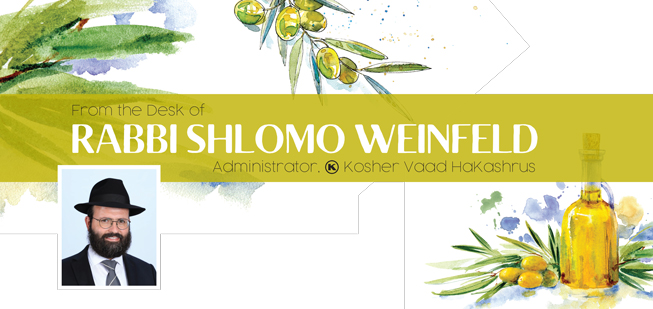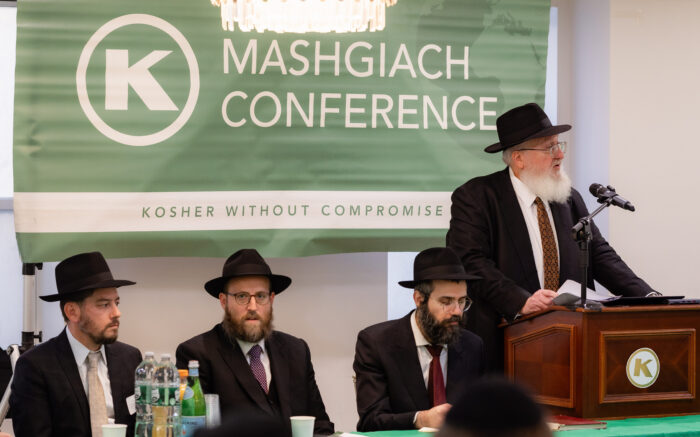The Jewish holiday of Chanukah focuses on the miracle of the Maccabees’ defeat of the Ancient Greek army. Of course, a main highlight of this victory was the discovery of the one, pure vessel of olive oil – seemingly enough for only one day — that kindled the menorah in the Beis HaMikdash for eight days. Our tradition teaches us to live our history as a true experience, and that it is applicable to our modern-day lives, not just as a commemoration of a historical event. In that spirit, let’s have a look at olive oil from the perspective of kashrus, as well as its spiritual significance.
Olives are a distinctive fruit, as one of the shivas haminim, and their oil has a unique status and importance in both Judaism and in the culinary world. The taste
and color of different types of olives can vary depending on where they were grown and how they were treated, and are a topic of mastery with aficionados. Olive oil has become a valuable commodity the world over, known for its versatility. Extra virgin olive oil, in particular, is valued for its fine flavor and health benefits. Olive trees only produce a full harvest every other year, which led the industry to develop multiple pressings to extract all oil from the olives. The various extraction methods account for the range of quality levels including extra virgin, or “cold press,” pure, and light olive oils.
Extra virgin olive oil, the most sought-after and finest in quality, is generally of low kashrus risk given that the process of making it is traditionally limited to simply squeezing the oil from the olives. However, there are a number of potential concerns to screen for regarding non-extra virgin olive oil, especially important in today’s age of mass production. For instance, due to the high demand of olive oil in general, some manufacturers may use additives in its production. This is among many other possible kashrus considerations, all of which necessitate a reliable kosher certification on non-extra virgin olive oil. (To read more details about the process of making olive oil, please see the Winter 2016 Issue of Kosher Spirit.)
Even for extra virgin olive oil, though, there is still the consideration of other halachos related to crops grown in Eretz Hakodesh (the land within the Biblical definition of Eretz Yisroel’s borders). These kashrus concerns consist of terumos and ma’aseros, which are the separation of the priestly tithes, as well as the consideration of orlah1; fruit that grew on a tree during its first three years of life. For any fruit grown in Eretz Hakodesh, regardless of Jewish or non-Jewish ownership, the OK utilizes the services of agronomists; experts who study plants used in agriculture, to verify that there are no orlah concerns. These professionals in crop science check the history of the trees from which the crops were taken in order to verify that the fruit is not orlah. Additionally, we have our kosher force of mashgichim ensure that terumos and ma’aseros were taken from the produce at hand.
Though it may be popular these days to take a less stringent approach with uncomplicated products such as extra virgin olive oil, nevertheless, OK Kosher upholds the value of certifying olive oil of all types according to these exacting standards. In the spirit of not compromising on purity, we can dive deeper into Jewish texts to support this notion. In the Mishna, olive oil is described by our sages as the most choshuv, or deluxe, variety of oil. This mirrors the Chumash in which Hashem instructs Moshe Rabbeinu to use only pure olive oil for lighting the menorah in the Beis Hamikdash. The Torah goes into further detail,
specifying that oil for this purpose should only be from the “first pressing,” which has been considered the finest quality oil since those times.
The Gemara tells us that olive oil symbolizes chochma (wisdom). Maseches Menachos mentions the people of a town called Tekoa, who were highly intelligent, attributing it to their diets, which were rich in olive oil. Regarding the story of Chanukah, Chassidus explains that the Ancient Greeks’ underlying, subconscious goal was to eradicate the spiritual manifestation of chochma from Yiddishkeit. They did not oppose the Jewish people’s culture or traditions as it were; rather
it was the belief in and allegiance to Hashem that offended their worldview. This is why, in battle, they did not remove the oil from the Beis HaMikdash. Instead, they took away its ritually pure status by breaking the seal, thus rendering it tamei. This explains why it was so important for the Chashmonaim to find pure, kosher olive oil with which to kindle the menorah. Halacha would have allowed the use of impure oil if there were no pure oil available. However, this particular fight revolved around emunah in Hashem. It was therefore all the more important to have used only pure oil, bearing the seal of the Kohen Gadol, for the menorah in the Beis Hamikdash, to affirm and underscore this intention.
As we always approach matters of ruchniyus, the lessons we learn from our history should be taken into our own lives in a practical way. Just as we all strive for spiritual growth as individuals, the OK’s approach to kashrus as an organization aims for the highest standard of supervision. We do this even when the product at hand is permissible according to some, in the spirit of not compromising on the spiritual level of purity.
The world of kashrus as a whole, and the OK in particular, is still within the year of aveilus for Rabbi Levy, ob”m. Chochmas HaTorah and kedushah were indeed very dear to him in every aspect of both his personal and professional life. From the early hours of the morning until late at night, Rabbi Levy was busy learning Torah and helping others to spread kedushah in the world. When challenged, he made sure to protect the principles of kashrus, without compromise, similarly to how the Chashmonaim guarded the spiritual purity of the ritual of lighting the menorah. May we be zoche to continued siyata di’shmaya to follow in his ways, and have brochos in all that we do until we merit to see Moshiach Tzidkeinu and experience techiyas hameisim and reunification with all those we have lost.
1. For more information about orlah see Kosher Spirit Tishrei 5781.
Rabbi Weinfeld is a member of the OK Kosher Vaad HaKashrus.


 EN
EN  ZH
ZH  KR
KR  BR
BR  ES
ES  IN
IN  IL
IL 




